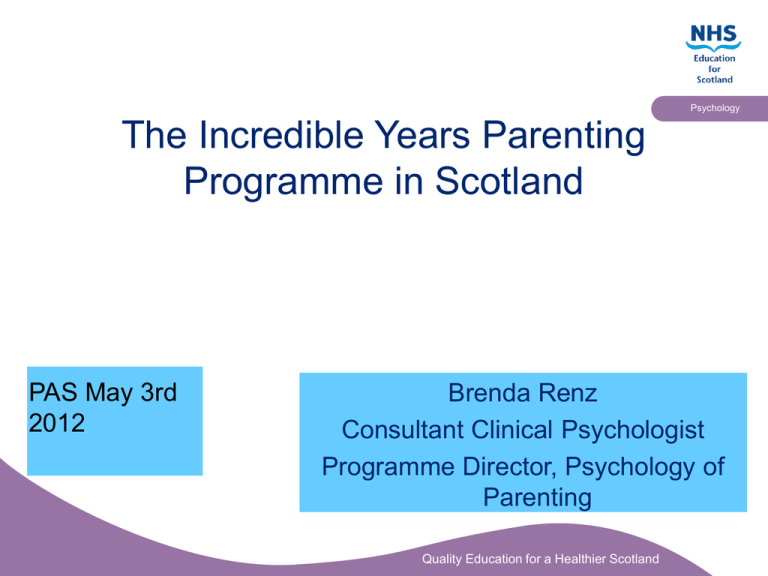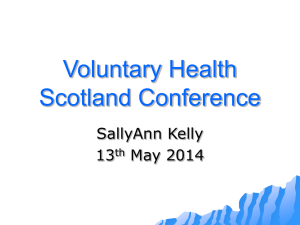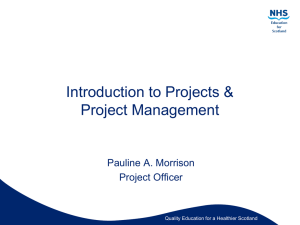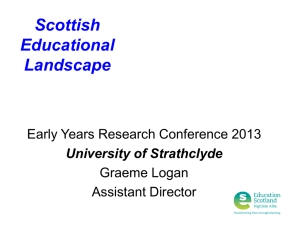View presentation here - Parenting across Scotland
advertisement

Psychology The Incredible Years Parenting Programme in Scotland PAS May 3rd 2012 Brenda Renz Consultant Clinical Psychologist Programme Director, Psychology of Parenting Quality Education for a Healthier Scotland Scottish policy environment • • • • • • • • Early Years Framework and Taskforce Preventive Spending Review Parenting Strategy Children’s Services legislation GIRFEC GUS data Healthcare Quality Strategy Mental Health Strategy Quality Education for a Healthier Scotland Psychology Why parenting interventions? Psychology The quality of care a child receives from his main caregiver is a primary mediator of child outcomes AND………. • positive parenting is a key protective factor buffering children against the full impact of risk laden adversities • AND………………...some actually work! Quality Education for a Healthier Scotland Knowing which programmes work best? Commissioners Toolkit database Interventions for Promoting Early Child Development for Health An environmental scan with special reference to Scotland Quality Education for a Healthier Scotland Psychology The Incredible Years Series of Programmes Psychology Teacher Classroom Management Programme Child Dinosaur Programme: Treatment 18 - 22 weekly sessions Babies and Toddler Parent Programmes BASIC Pre-school Parent Programme: 14-18 weekly sessions, 3-6 years Child Dinosaur Programme: Classroom 2 sessions per week, 30 weeks School Aged BASIC Parent Programme: 14-20 sessions, 6– 12 years School Readiness Parent Programme: 4 sessions, 4-5 years ADVANCED Parent Programme: 8 sessions helping adults problem solve Quality Education for a Healthier Scotland www.incredibleyears.com •Groups of up to 12 parents meet weekly for (14-18 wks) •2 group leaders engage collaboratively and in a nonjudgemental and nurturing fashion with parents •Video-clips of parent-child interactions guide group discussion to help parents derive principles of positive parenting •in-session practice primes home activities •Group support is fostered Quality Education for a Healthier Scotland Psychology The evidence base • Multiple RCTs and prestigious awards • Independent replications in various countries (including England and Wales) – in real life settings • 2/3 of “diagnosable” children move out of clinical range after a 12 week parenting group • Outcomes maintained up to at least 6 years after intervention • High parent-satisfaction ratings • AND…… health economists conclude they are cost effective! Quality Education for a Healthier Scotland Psychology Cost of doing nothing by age 28 the costs to the public purse for children with conduct disorder in childhood were 10 times higher (£70,019) than for those with no behavioural problems (£7,423) (2001 figures) Quality Education for a Healthier Scotland Psychology Psychology Quality Education for a Healthier Scotland Psychology of Parenting Project (PoPP) Psychology • to improve outcomes for children with significant levels of early-onset disruptive behaviour problems • to increase workforce capacity around evidencebased parenting interventions for such children and their families Quality Education for a Healthier Scotland Practice scan in Scotland (2010) Annual training events hosted since 2005 Number of practitioners trained = approx 200 Scotland-wide peer network Few groups running -most in CAMHS and not being delivering with fidelity Quality Education for a Healthier Scotland Psychology Some lessons to be learned from “Implementation Science”.. Only a combination of effective interventions and effective implementation produces good outcomes Interventions that work are – rarely simple – inexpensive – easy to implement Quality Education for a Healthier Scotland Psychology More lessons to be learned • Organisational support is required at all levels • The “train and hope” approach does not work • Local stakeholder involvement is essential • Fidelity is not a natural default position Quality Education for a Healthier Scotland Psychology Standardised Post –training Intervention accreditation materials scheme Standardised trainings (3 days) How IY addresses implementation Supervisory Clinician Delivered only challenges Competence manuals in delivery of Video vignettes content and designed toto adherence elicit group collaborative discussion and therapeutic social learning process is theory at assessed principles each stage of accreditation Book for through e.g.; parents teach content Self-monitoring andchecklists underlying theory Peer and model supervision collaborative Peer coaching therapy by accredited processes group leaders video-tape Home activity review of fridge notes adherence to model Consultation days with accredited mentors and bystructures accredited trainers who Quality Education for a Healthier Scotland Psychology PoPP plan • Scotland-wide 4 year roll-out focus on 3 and 4 year olds with elevated levels of behaviour problems • Health-led initiative promoting interagency delivery aligned with local needs and GIRFEC • A robust implementation plan designed to maximise fidelity and sustainability Quality Education for a Healthier Scotland Psychology PoPP implementation Improved Outcomes Psychology • Aligning evidencebased activity with strategic objectives High • Standardised core training fidelity Continuous learning and accreditation data-driven , “intelligent” decision-making • “On the job” supervision and coaching • Video-based peer supervision • Self-regulating practitioners Sustainable evidence-based parenting programmes •Identifying local champions • Systems that value and nurture staff development • Supportive resource allocation systems •Robust data management systems Leadership Education for a Healthier Scotland Technicalleadership, Adaptive support co-ordination andQuality technical support Progress to date • Widespread support for the plan • 2 Early Implementer sites • Over 100 more staff trained • Parent groups being delivered ( with supervisory support) – – – – – – Lothian GG&C ( Refrewshire) Borders Ayrshire Fife Forth valley Quality Education for a Healthier Scotland Psychology






